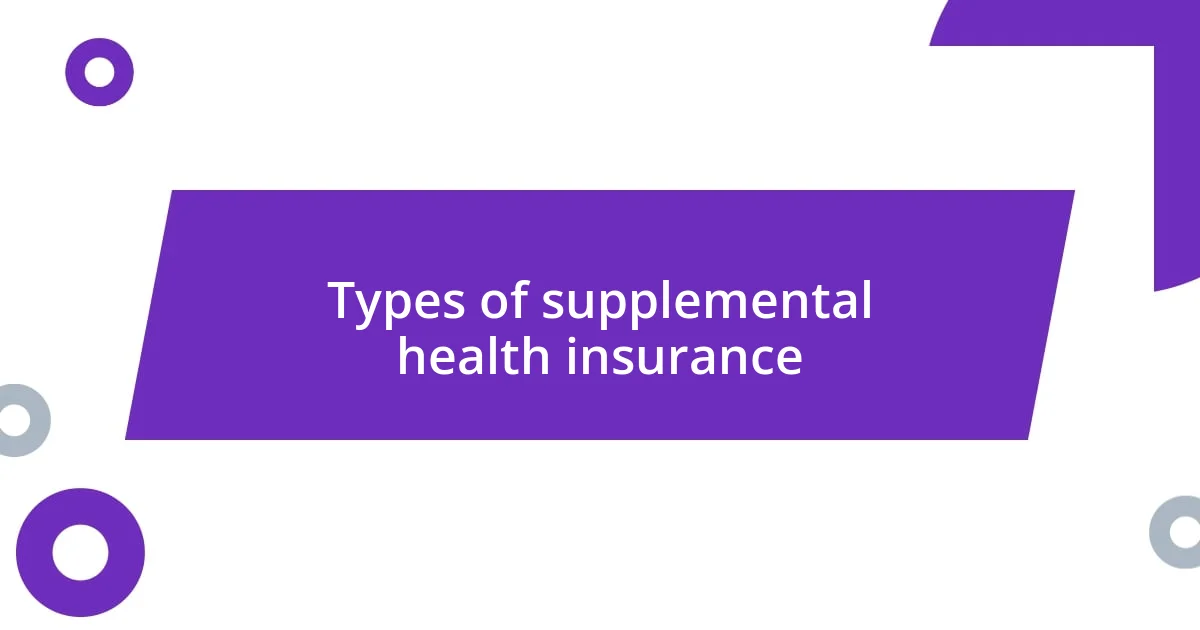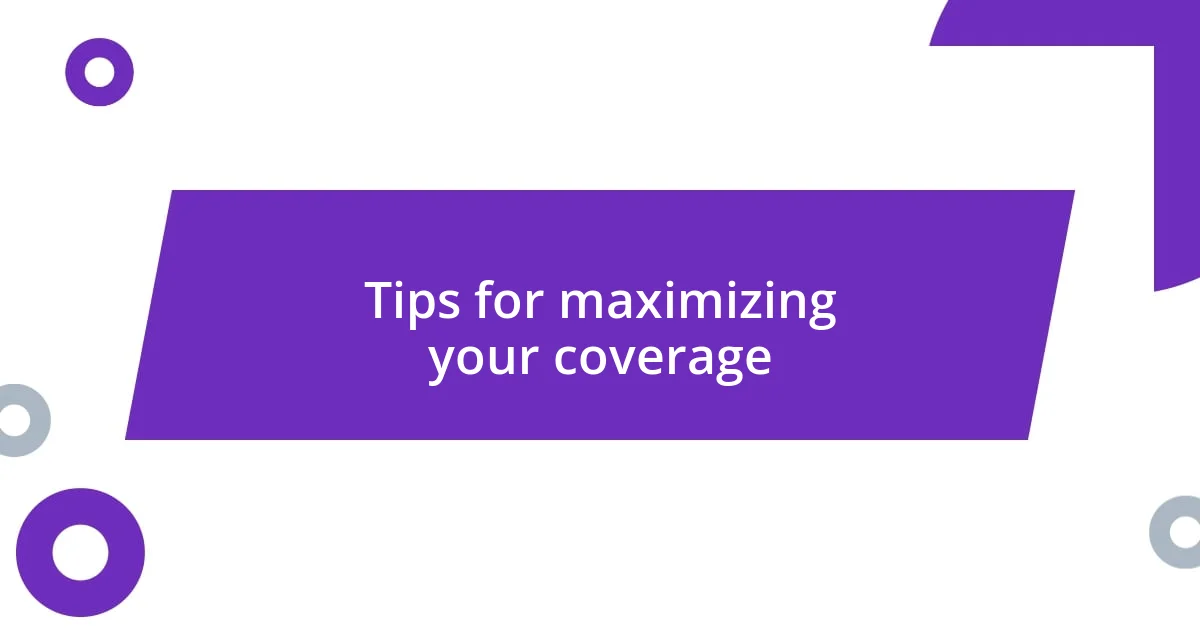Key takeaways:
- Supplemental health insurance fills gaps left by primary insurance, reducing out-of-pocket expenses and providing financial peace during health crises.
- Types of supplemental insurance include dental and vision coverage, critical illness benefits, and accident insurance, each addressing specific healthcare needs.
- Common misconceptions include thinking supplemental insurance is unnecessary and complicated; reviewing policies annually and understanding coverage can maximize benefits.

Understanding supplemental health insurance
Supplemental health insurance is designed to fill the gaps left by your primary health insurance. I remember when I had a sudden medical issue and realized my health plan didn’t cover certain specialist visits. It was a wake-up call; I understood how vital supplemental coverage could be in times of unexpected needs.
Many people might wonder why they should invest in additional coverage when they already have a primary plan. From my experience, I can say that even the best primary insurance can leave you responsible for significant out-of-pocket costs. Supplemental insurance can help ease that financial strain, especially when you’re facing critical health challenges.
Some types of supplemental insurance cover specific needs, like dental or vision care, while others focus on critical illness or accident coverage. I once met someone who had suffered a serious injury; luckily, their supplemental policy provided a cash benefit that made their recovery less daunting. It’s moments like these that highlight the importance of understanding what supplemental health insurance can offer you in times of need.

Benefits of supplemental health insurance
When I consider the benefits of supplemental health insurance, a few key advantages stand out to me. It significantly reduces financial anxiety during health crises. For instance, I remember hearing from a friend who faced a hefty medical bill after a hospital stay. Thankfully, because they had supplemental coverage, they were able to breathe a sigh of relief when a portion of that bill was covered, allowing them to focus on recovery rather than finances.
Here are some notable benefits of supplemental health insurance:
– Enhanced Coverage: It often covers services that your primary insurance may not, such as dental, vision, or even alternative treatments.
– Reduced Out-of-Pocket Expenses: Lower the burden of copays and deductibles during major health events.
– Income Replacement: Some plans offer cash benefits during recovery, helping to manage daily expenses when you’re unable to work.
– Peace of Mind: Knowing you have extra protection allows you to focus on getting well rather than stressing over costs.
– Tailored Options: You can choose a plan that fits your specific health needs, which I find incredibly empowering.

Types of supplemental health insurance
Supplemental health insurance comes in various forms, each designed to address different aspects of health care needs. For instance, I often hear about dental and vision coverage being popular among those who want to ensure they can afford routine check-ups and necessary treatments. I remember a time when a friend had to get unexpected dental work done, and having that supplemental coverage truly saved her from significant out-of-pocket expenses. The joy on her face when she found out how much of the cost would be covered felt like a burden lifted.
Another type of supplemental insurance is critical illness coverage, which pays a lump sum if you’re diagnosed with a severe health condition. Several years ago, I encountered a situation where a colleague received this type of benefit after being diagnosed with cancer. This financial support allowed her to focus on her treatment instead of worrying about bills. It’s heartbreaking to think about the emotional and financial toll of such illnesses, and this coverage brings peace in those tumultuous times.
Lastly, accident insurance can be a lifesaver for many, providing benefits for unexpected injuries. I once met someone who sustained an injury during a sporting event. Fortunately, they had accident insurance that provided immediate cash to help cover medical expenses and recovery needs. This not only aided in their physical healing but eased the financial tension during a tough period. Different types of coverage serve distinct purposes, making it essential to assess which might benefit you most.
| Type of Supplemental Insurance | Description |
|---|---|
| Dental and Vision | Covers routine check-ups and treatments for oral and eye health needs. |
| Critical Illness | Pays a lump sum upon diagnosis of severe conditions such as cancer or heart attacks. |
| Accident Insurance | Provides benefits for unforeseen injuries, covering medical expenses and recovery costs. |

Common misconceptions about supplemental insurance
Many people think that supplemental health insurance is just an unnecessary expense, assuming their primary insurance covers everything they need. I’ve spoken to countless friends who felt this way until they faced unexpected medical costs. In those moments, they realized that without supplemental insurance, they could have been left scrambling to cover hefty bills. Why wait until you’re in a crisis to find out what isn’t covered?
Another common misconception is that supplemental insurance is only for the elderly or those with chronic conditions. This couldn’t be farther from the truth! I remember chatting with a younger colleague who dismissed the idea of getting supplemental coverage until she suffered a sports injury that kept her from working for weeks. The financial strain was overwhelming, and she wished she had considered additional protection earlier. It’s important to understand that accidents and illnesses can strike anyone, regardless of age.
Many also mistakenly believe that enrolling in supplemental insurance is complicated and not worth the effort. From my experience, shopping for supplemental insurance can actually be pretty straightforward if you take the time to compare options. I recall feeling overwhelmed when I first started looking into it, but once I listed my specific health needs, the choices became clearer. The sense of security I gained from having that extra layer of coverage was well worth the initial effort. Isn’t it better to invest a little time now than to face the stress of high medical bills later?

Tips for maximizing your coverage
Understanding how to maximize your supplemental health insurance coverage can truly make a difference when unexpected medical costs arise. I’ve found that carefully reviewing your policy each year is crucial. Just last month, I sat down with my policy documents and discovered several wellness benefits I hadn’t been utilizing. Engaging with your insurance provider can also uncover hidden perks—like discounts on gym memberships or preventive screenings—that can enhance your overall health while keeping costs down.
It’s essential to keep track of your medical expenses and understand what is covered. I can still picture the surprise on my friend’s face when she realized that her numerous doctor visits last year were only partially covered. After diving into her supplemental policy, she discovered limits on certain types of visits. Documenting all expenses helps you know when and how to file claims and, more importantly, prevents you from missing out on what is rightfully yours. Have you ever felt like your policy was a vague mystery? Keeping meticulous records can help demystify your coverage and ensure you get the most benefit.
Lastly, don’t hesitate to consider the importance of timely claims submission. I once waited too long to file a claim after a minor surgery, only to realize I missed the deadline for full reimbursement. It’s easy to get busy with life, but I learned that setting reminders for claim submission deadlines can save you from potential financial losses. Making this a part of your routine can bring peace of mind and safeguard your financial health. Isn’t it worth a little organization to protect yourself against future surprises?














